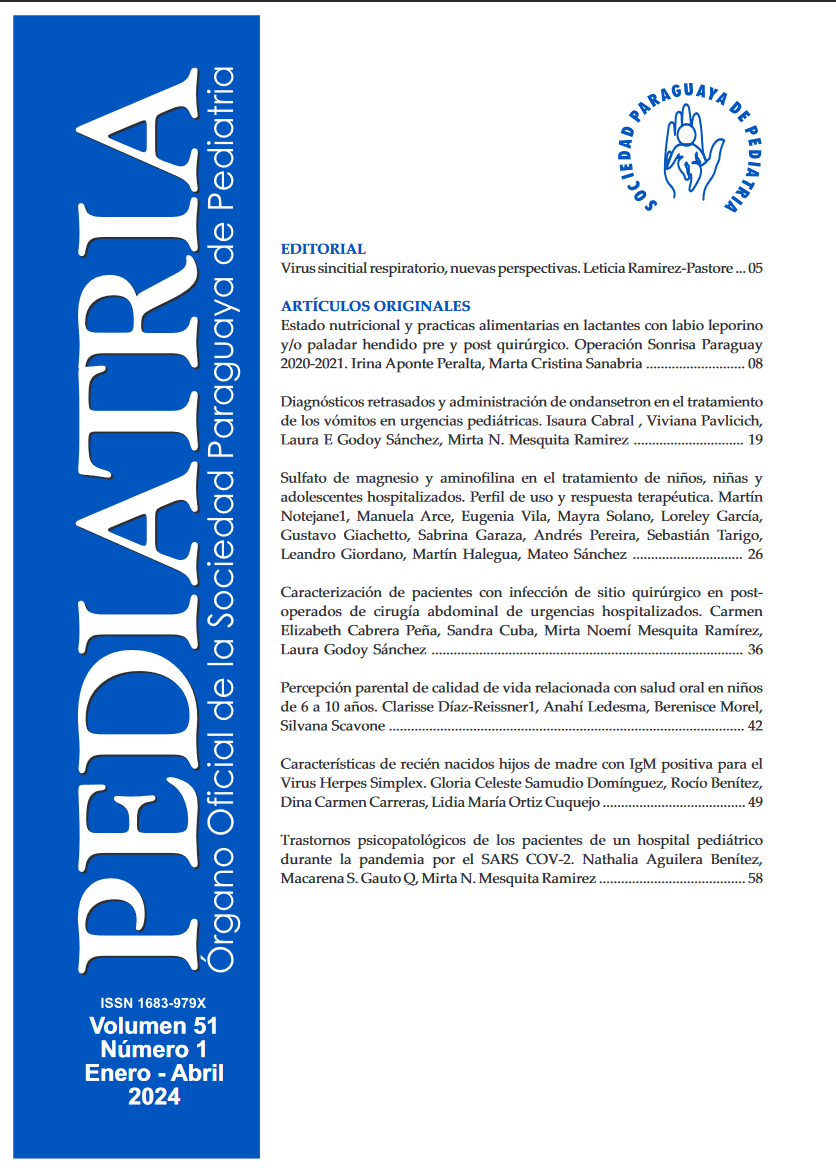Características de recién nacidos hijos de madre con IgM positiva para el Virus Herpes Simplex
DOI:
https://doi.org/10.31698/ped.51012024007Palabras clave:
infección neonatal por Herpes Virus Simplex, encefalitis por herpes, cribado serológico maternoResumen
Introducción: El herpes connatal es una entidad infrecuente asociada a elevada morbimortalidad. La probabilidad de transmisión al recién nacido va de 5% al 85%. El diagnóstico se dificulta por falta de clínica, serología no confiable y por la no disponibilidad de PCR en los servicios públicos de países en vías de desarrollo. La IgM en gestantes podría ser utilizada como un marcador de sospecha para evaluar al neonato.
Objetivo: Caracterizar a los recién nacidos, hijos de gestantes con IgM positiva para HVS 1-2 y la frecuencia de encefalitis en los infantes.
Materiales y métodos: Estudio observacional, descriptivo, prospectivo, realizado de mayo de 2020 a octubre de 2021. Se incluyeron recién nacidos (RN) de madres con IgM positiva para Herpes Virus Simplex (HVS) a partir de la segunda mitad del embarazo. En el RN se realizó serología IgG e IgM, y además, PCR- RT para HVS 1-2 en sangre y/o LCR, excluyéndose los nacidos en otras maternidades y/o sin datos de serología materna.
Resultados: 36 pacientes. Edad materna 28 años (DS + 4), 5% con antecedentes de HVS, 61% cesárea. 36% prematuros, 13% RCIU. Síntomas agudos en el RN 22%. De ellos, 19% plaquetopenia, 44% alteración de GOT. 63% PCR HVS en sangre y 44% en LCR. Se encontró hemorragia, hidrocefalia, leucomalacia en 27%. No se encontró diferencias en la expresión clínica por tipo de parto.
Conclusiones: Los RN hijos de gestantes con IgM positiva para VHS desde la segunda mitad del embarazo o periparto, presentaron infección por VHS determinada por PCR en sangre o LCR, independiente de la vía del parto. El diagnóstico serológico en embarazadas permite la pesquisa, diagnóstico y tratamiento temprano del RN.
Métricas
Citas
Cherpes TL, Matthews DB, Maryak SA. Neonatal herpes simplex virus infection. Clin Obstet Gynecol. 2012; 55(4):938-44. doi: 10.1097/GRF.0b013e31827146a7
Pinninti SG, Kimberlin DW. Preventing herpes simplex virus in the newborn. Clin Perinatol. 2014;41(4):945-55. doi: 10.1016/j.clp.2014.08.012
Samies NL, James SH. Prevention and treatment of neonatal herpes simplex virus infection. Antiviral Res. 2020;176:104721. doi: 10.1016/j.antiviral.2020.104721
Gutierrez KM, Halpern MSF, Maldonado Y, Arvin AM. The epidemiology of neonatal herpes simplex virus in California from 1985 to 1995. J Infect Dis. 1999;180(1):199–202.
Xu F, Markowitz LE, Gottlieb SL, Berman SM. Seroprevalence of herpes simplex virus types 1 and 2 in pregnant women in the United States. Am J Obstet Gynecol. 2007;196:43.e1–43.e6. doi: 10.1016/j.ajog.2006.07.051
Garland SM, Steben M. Genital herpes. Best Pract Res Clin Obstet Gynaecol. 2014;28(7):1098-110. doi: 10.1016/j.bpobgyn.2014.07.015
Anzivino E, Fioriti D, Mischitelli M, Bellizzi A, Barucca V, Chiarini F, Pietropaolo V. Herpes simplex virus infection in pregnancy and in neonate: status of art of epidemiology, diagnosis, therapy and prevention. Virol J. 2009;6:40. doi: 10.1186/1743-422X-6-40
Hill J, Roberts S. Herpes simplex virus in pregnancy: new concepts in prevention and management. Clin Perinatol. 2005;32(3):657-70. doi: 10.1016/j.clp.2005.05.008
Kimberlin DW, Baley J; Committee on infectious diseases; Committee on fetus and newborn. Guidance on management of asymptomatic neonates born to women with active genital herpes lesions. Pediatrics. 2013;131(2):e635-46. doi: 10.1542/peds.2012-3216
Brown ZA, Wald A, Morrow RA, Selke S, Zeh J, Corey L. Effect of serologic status and cesarean delivery on transmission rates of herpes simplex virus from mother to infant. JAMA. 2003;289:203–209. doi: 10.1001/jama.289.2.203
Benedetti J, Corey L, Ashley R. 1994. Recurrence rates in genital herpes after symptomatic first-episode infection. Ann Intern Med. 121:847–854. doi: 10.7326/0003-4819-121-11-199412010-00004
Langenberg AG, Corey L, Ashley RL, Leong WP, Straus SE. A prospective study of new infections with herpes simplex virus type 1 and type 2. Chiron HSV Vaccine Study Group. N Engl J Med. 1999;341:1432–1438.
Wald A, Zeh J, Selke S, Warren T, Ryncarz AJ, Ashley R, et al. Reactivation of genital herpes simplex virus type 2 infection in asymptomatic seropositive persons. N Engl J Med. 2000; 342:844–850. doi: 10.1056/NEJM200003233421203
Mark K, Wald A, Magaret A, Selke S, Olin L, Huang M, Corey L. Rapidly cleared episodes of herpes simplex virus reactivation in immunocompetent adults. J Infect Dis. 2008; 198:1141–1149. doi: 10.1086/591913
Johnston C, Corey L. Current Concepts for Genital Herpes Simplex Virus Infection: Diagnostics and Pathogenesis of Genital Tract Shedding. Clin Microbiol Rev. 2016;29(1):149-61. doi: 10.1128/CMR.00043-15
Baquero-Artigao F. Actualización en infecciones herpéticas congénitas y neonatales: infección por citomegalovirus y herpes simple. Rev Neurol 2017;64 (Supl. 3):S29-S33 doi: 10.33588/rn.64S03.2017160
Chatroux IC, Hersh AR, Caughey AB. Herpes Simplex Virus Serotyping in Pregnant Women With a History of Genital Herpes and an Outbreak in the Third Trimester of Pregnancy: A Cost-Effectiveness Analysis. Obstet Gynecol. 2021(1);137(1):63-71. doi: 10.1097/AOG.0000000000004181
Prober CG, Sullender WM, Yasukawa LL, Au DS, Yeager AS, Arvin AM. Low risk of herpes simplex virus infections in neonates exposed to the virus at the time of vaginal delivery to mothers with recurrent genital herpes simplex virus infections. N Engl J Med. 1987; 29;316(5):240-4. doi: 10.1056/NEJM198701293160503
Navarro-O D, Navalpotro-R D, Fraile-S O. Actualización en el diagnóstico del herpes genital. Sociedad española de microbiología. Servicio de Microbiología del Hospital Clínico Universitario de Valencia. Página 1 de 6. [Citado 03 dic 2023] Disponible en: https://seimc.org/ficheros/ccs/revisionestematicas/viromicromol/Herpesgen.pdf/274-274
Tronstein E, Johnston C, Huang ML, Selke S, Magaret A, Warren T, et al. Genital shedding of herpes simplex virus among symptomatic and asymptomatic persons with HSV-2 infection. JAMA 2011;305:1441–1449. doi: 10.1001/jama.2011.420
Jung S, Theel ES. Overutilization of IgM Serologic Assays for Herpes Simplex Virus. J Appl Lab Med. 2021;5(1):241-243. doi: 10.1373/jalm.2019.030890
Samies NL, James SH. Prevention and treatment of neonatal herpes simplex virus infection. Antiviral Res. 2020;176:104721. doi: 10.1016/j.antiviral.2020.104721
Descargas
Publicado
Cómo citar
Número
Sección
Licencia
Derechos de autor 2024 Pediatría (Asunción)

Esta obra está bajo una licencia internacional Creative Commons Atribución 4.0.
Todo el contenido de este sitio está bajo una Licencia de Atribución Creative Commons.






 Todo el contenido de esta revista, está bajo
Todo el contenido de esta revista, está bajo 